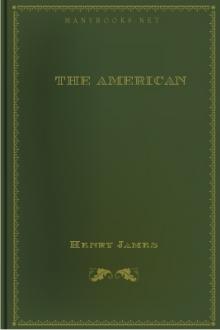Under the Red Robe by Stanley John Weyman (macos ebook reader TXT) 📗

- Author: Stanley John Weyman
Book online «Under the Red Robe by Stanley John Weyman (macos ebook reader TXT) 📗». Author Stanley John Weyman
‘No,’ I said. ‘Why do you ask?’
‘Because,’ he answered, with an ugly smile, ‘this is not a very healthy place for strangers.’
‘Ah!’ I retorted. ‘But the border air suits me, you see,’
It was a lucky answer, for, taken with my talk the night before, it puzzled him, by suggesting that I was on the losing side, and had my reasons for lying near Spain. Before he had done scratching his head over it, the clatter of hoofs broke the sleepy quiet of the village street, and the lady I had seen the night before rode quickly round the corner, and drew her horse on to its haunches. Without looking at me, she called to the innkeeper to come to her stirrup.
He went. The moment his back was turned, I slipped away, and in a twinkling was hidden by a house. Two or three glum-looking fellows stared at me as I passed down the street, but no one moved; and in two minutes I was clear of the village, and in a half-worn track which ran through the wood, and led—if my ideas were right—to the Chateau. To discover the house and learn all that was to be learned about its situation were my most pressing needs; and these, even at the risk of a knife thrust, I was determined to satisfy.
I had not gone two hundred paces along the path, however, before I heard the tread of a horse behind me, and I had just time to hide myself before Madame came up and rode by me, sitting her horse gracefully, and with all the courage of a northern woman. I watched her pass, and then, assured by her presence that I was in the right road, I hurried after her. Two minutes walking at speed brought me to a light wooden bridge spanning a stream. I crossed this, and, as the wood opened, saw before me first a wide, pleasant meadow, and beyond this a terrace. On the terrace, pressed upon on three sides by thick woods, stood a grey mansion, with the corner tourelles, steep, high roofs, and round balconies, that men loved and built in the days of the first Francis.
It was of good size, but wore a gloomy aspect. A great yew hedge, which seemed to enclose a walk or bowling-green, hid the ground floor of the east wing from view, while a formal rose garden, stiff even in neglect, lay in front of the main building. The west wing, of which the lower roofs fell gradually away to the woods, probably contained the stables and granaries.
I stood a moment only, but I marked all, and noted how the road reached the house, and which windows were open to attack; then I turned and hastened back. Fortunately, I met no one between the house and the village, and was able to enter my host’s with an air of the most complete innocence.
Short as had been my absence, however, I found things altered there. Round the door lounged three strangers—stout, well-armed fellows, whose bearing, as they loitered and chattered, suggested a curious mixture of smugness and independence. Half a dozen pack-horses stood tethered to the post in front of the house; and the landlord’s manner, from being rude and churlish only, had grown perplexed and almost timid. One of the strangers, I soon found, supplied him with wine; the others were travelling merchants, who rode in the first one’s company for the sake of safety. All were substantial men from Tarbes—solid burgesses; and I was not long in guessing that my host, fearing what might leak out before them, and, particularly, that I might refer to the previous night’s disturbance, was on tenter-hooks while they remained.
For a time this did not suggest anything to me. But when we had all taken our seats for supper, there came an addition to the party. The door opened, and the fellow whom I had seen the night before with Madame de Cocheforet entered and took a stool by the fire. I felt sure that he was one of the servants at the Chateau; and in a flash his presence inspired me with the most feasible plan for obtaining admission which I had yet hit upon. I felt myself grow hot at the thought—it seemed so full of promise, yet so doubtful—and, on the instant, without giving myself time to think too much, I began to carry it into effect.
I called for two or three bottles of better wine, and, assuming a jovial air, passed it round the table. When we had drunk a few glasses I fell to talking, and, choosing politics, took the side of the Languedoc party and the malcontents in so reckless a fashion that the innkeeper was beside himself at my imprudence. The merchants, who belonged to the class with whom the Cardinal was always most popular, looked first astonished and then enraged. But I was not to be checked; hints and sour looks were lost upon me. I grew more outspoken with every glass, I drank to the Rochellois, I swore it would not be long before they raised their heads again; and, at last, while the innkeeper and his wife were engaged lighting the lamp, I passed round the bottle and called on all for a toast.
‘I’ll give you one to begin,’ I bragged noisily. ‘A gentleman’s toast! A southern toast! Here is confusion to the Cardinal, and a health to all who hate him!’
‘MON DIEU!’ one of the strangers cried, springing from his seat in a rage. ‘I am not going to stomach that! Is your house a common treason-hole,’ he continued, turning furiously on the landlord, ‘that you suffer this?’
‘Hoity-toity!’ I answered, coolly keeping my seat. ‘What is all this? Don’t you relish my toast, little man?’
‘No—nor you!’ he retorted hotly; ‘whoever you may be!’
‘Then I will give you another,’ I answered, with a hiccough. ‘Perhaps it will be more to your taste. Here is the Duke of Orleans, and may he soon be King!’
CHAPTER III. THE HOUSE IN THE WOOD
Words so reckless fairly shook the three men out of their anger. For a moment they glared at me as if they had seen a ghost. Then the wine merchant clapped his hand on the table.
‘That is enough,’ he said, with a look at his companions. ‘I think that there can be no mistake about that. As damnable treason as ever I heard whispered! I congratulate you, sir, on your boldness. As for you,’ he continued, turning with an ugly sneer to the landlord, ‘I shall know now the company you keep! I was not aware that my wine wet whistles to such a tune!’
But if he was startled, the innkeeper was furious, seeing his character thus taken away; and, being at no time a man of many words, he vented his rage exactly in the way I wished, raising in a twinkling such an uproar as can scarcely be conceived. With a roar like a bull’s, he ran headlong at the table, and overturned it on the top of me. Fortunately the woman saved the lamp, and fled with it into a corner, whence she and the man from the Chateau watched the skirmish in silence; but the pewter cups and platters flew spinning across the floor, while the table pinned me to the ground among the ruins of my





Comments (0)